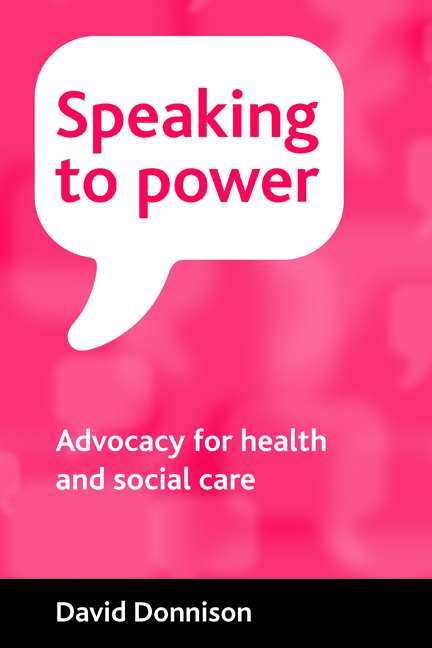Book contents
- Frontmatter
- Dedication
- Contents
- Why and how we wrote this book
- Introduction
- one Origins of advocacy
- two Scotland gives a lead
- three What advocates do: their main clients
- four What advocates do: questions and dilemmas
- five Groups and communities
- six Setting up an advocacy project and running it
- seven Volunteers
- eight Making advocacy accountable
- nine Roadblocks
- ten Looking ahead
- Further reading
- Index
two - Scotland gives a lead
Published online by Cambridge University Press: 05 July 2022
- Frontmatter
- Dedication
- Contents
- Why and how we wrote this book
- Introduction
- one Origins of advocacy
- two Scotland gives a lead
- three What advocates do: their main clients
- four What advocates do: questions and dilemmas
- five Groups and communities
- six Setting up an advocacy project and running it
- seven Volunteers
- eight Making advocacy accountable
- nine Roadblocks
- ten Looking ahead
- Further reading
- Index
Summary
Questions posed
The story we have told thus far is typical of the way a social reform takes shape. First there are economic and social changes: in this case, labour scarcities which make hospital and residential care more expensive, new drugs which make them less necessary, more jobs, more subsidised housing and more generous social benefits to help sick and disabled people survive in the community. The same things were happening in every western country. In most of them the numbers in mental hospitals peaked between 1965 and 1975. In Scotland there has been a dramatic reduction since then in the numbers of patients in these hospitals, but slightly more are entering them – most of them only for short periods. Difficult decisions had to be made about the small minority of these patients who had to be treated under compulsion, whether in hospitals or in the community. These decisions were taken by sheriffs’ courts, which dealt with piles of papers and rarely saw the patients themselves.
Thus economic and social changes create new problems but also offer hope for better solutions: particularly, in this case, better care in the community for all sorts of people who no longer have to be confined in hospitals.
Also playing a part in the story were social and political changes, such as the growth of an increasingly well-informed and litigious population, more inclined to question authority. Complaints about health care reaching the UK's General Medical Council numbered 1,087 in the year 1991/92. Thirteen years later, in 2004/05, they had risen more than fourfold to 4,452. A growing array of increasingly confident voluntary bodies had grown up to speak for various groups with special needs. Meanwhile, the whole idea of human rights was spreading, and powerful movements were demanding equal rights for women, for minority ethnic groups, for gays and lesbians and for others.
In Scotland, as elsewhere, groups speaking for people with mental illnesses or learning disabilities – together we will call them mental disorders – came fairly late in the growing queue of those demanding a response from the state to their needs and rights: late and with less political clout.
- Type
- Chapter
- Information
- Speaking to PowerAdvocacy for Health and Social Care, pp. 25 - 36Publisher: Bristol University PressPrint publication year: 2009



